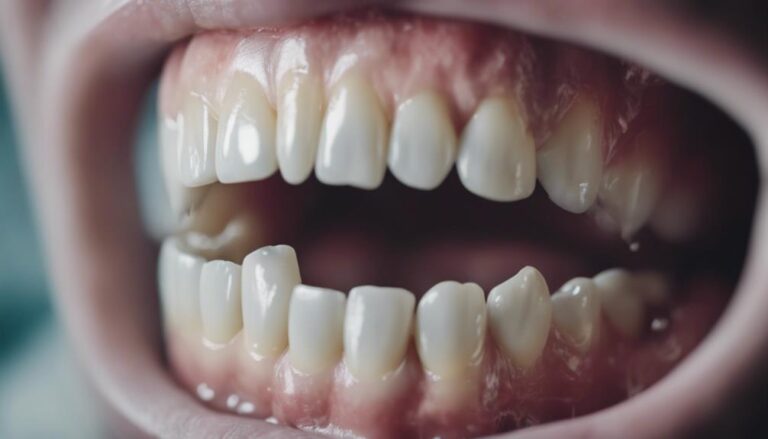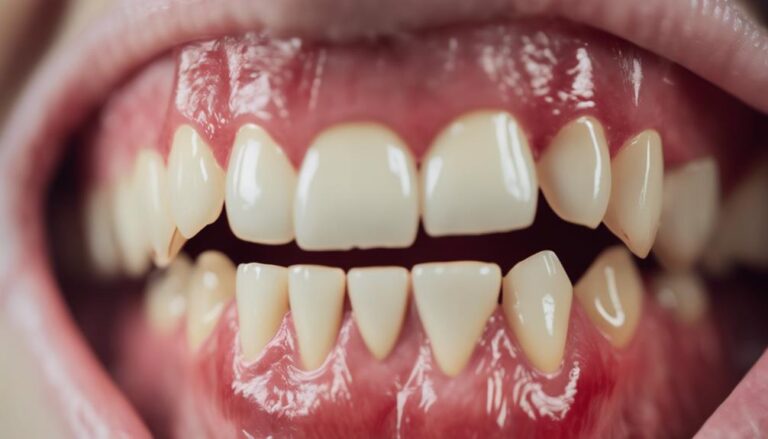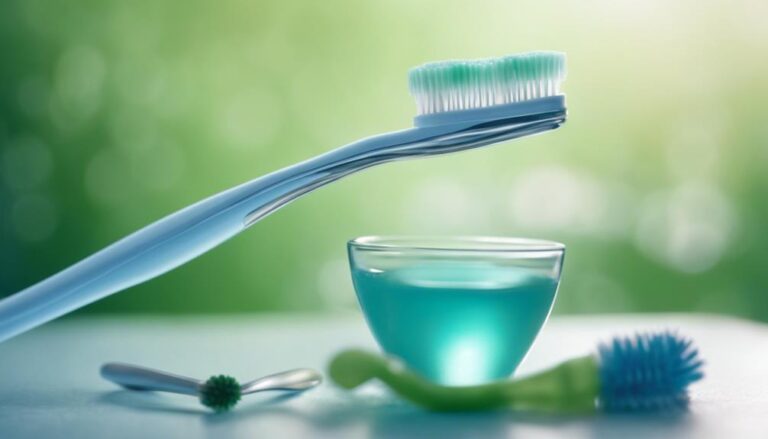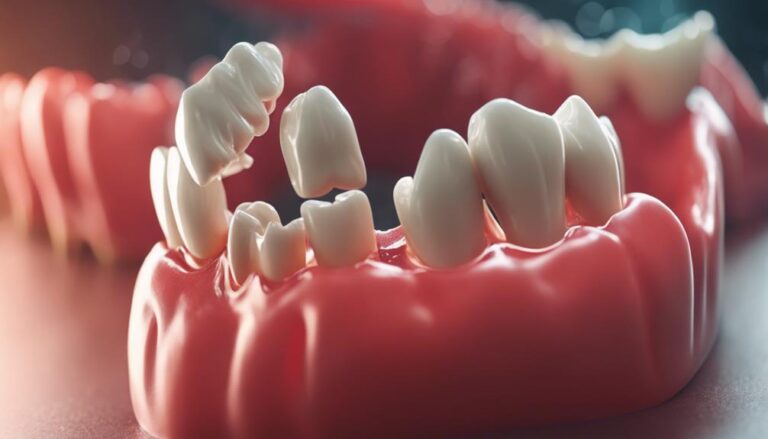Identifying gum disease is essential for oral health. Causes include poor oral hygiene and plaque build-up from bacteria thriving on sugars. Symptoms like bleeding or receding gums, loose teeth, and bad breath indicate gum disease. Smoking worsens oral health issues, and stress weakens the immune system. Maintaining good oral hygiene, staying hydrated, and having a balanced diet are essential. If you want to discover more insights into preventing gum disease, exploring related factors and treatment options can provide valuable information.
Key Takeaways
- Plaque build-up from poor oral hygiene causes gum disease.
- Symptoms like bleeding, bad breath, and receding gums indicate gum disease.
- Smoking and stress worsen gum disease risks and symptoms.
- Regular dental check-ups aid in early detection and prevention.
- Proper diet, water intake, and oral hygiene prevent bad breath and gum disease.
Gum Disease Overview
Examining the prevalence and impact of gum disease reveals important insights into oral health. Gum disease prevention plays a vital role in maintaining excellent oral hygiene. Regular brushing and flossing, along with routine dental check-ups, are essential in preventing gum disease. Additionally, incorporating an antibacterial mouthwash into one’s oral care routine can help reduce the risk of developing gum disease.
When it comes to gum disease treatment, early intervention is key. Professional dental cleanings can remove plaque and tartar buildup, preventing the progression of gum disease. In cases where gum disease has advanced, more intensive treatments such as scaling and root planing may be necessary to remove bacteria from below the gumline. For severe cases, surgical interventions like flap surgery or gum grafts may be required to restore gum health.
Understanding the importance of gum disease prevention and seeking timely treatment can greatly impact one’s overall oral health and well-being. It’s essential to prioritize regular dental care to prevent and address gum disease effectively.
Common Causes of Gum Disease
Understanding the common causes of gum disease is essential for maintaining excellent oral health. Two significant factors that contribute to gum disease are diet choices and dental check-ups.
Firstly, diet plays an important role in oral health. Consuming sugary foods and beverages increases the risk of developing gum disease. Bacteria in the mouth feed on sugars, producing acids that can harm the gums and lead to inflammation. A diet high in fruits, vegetables, and lean proteins can help maintain healthy gums and prevent gum disease.
Secondly, regular dental check-ups are necessary for preventing gum disease. Visiting the dentist for routine cleanings and examinations helps remove plaque and tartar buildup, which are leading causes of gum disease. Additionally, early detection of gum disease symptoms such as redness, swelling, or bleeding gums can help prevent the condition from progressing.
Plaque Build-Up
To address the issue of gum disease effectively, one must recognize the detrimental effects of plaque build-up on oral health. Plaque, a sticky film of bacteria that forms on teeth, is a primary factor in the development of gum disease. It thrives on sugars and starches from food, producing acids that attack tooth enamel and irritate gums. Without proper oral hygiene, plaque hardens into tartar, which can only be removed by a dental professional during regular dental visits.
Maintaining good oral hygiene is vital in preventing plaque build-up. Brushing teeth at least twice a day, flossing daily, and using mouthwash help remove plaque and prevent its accumulation. However, even with meticulous oral care, regular dental visits are essential to remove hardened plaque and detect early signs of gum disease. Dentists can provide professional cleanings and offer guidance on effective oral hygiene practices tailored to individual needs.
Poor Oral Hygiene
Poor oral hygiene greatly increases the risk of developing gum disease due to the accumulation of plaque and bacteria in the mouth. Gum disease prevention starts with good oral hygiene practices such as brushing teeth at least twice a day and flossing daily. Neglecting these routines allows plaque to build up along the gumline, leading to inflammation and potential infection.
Regular dental cleaning appointments are essential for removing tartar, a hardened form of plaque that can’t be removed by brushing alone. Dental cleaning not only helps prevent gum disease but also aids in early detection. During these visits, a dental professional can assess the health of your gums, provide guidance on proper oral hygiene techniques, and address any issues before they progress.
Smoking and Tobacco Use
Smoking and tobacco use greatly contribute to the development and progression of gum disease by exacerbating oral health issues caused by poor oral hygiene. The chemicals in tobacco products harm the gums, making them more susceptible to infections. Nicotine restricts blood flow to the gums, affecting the ability to fight off bacteria and heal properly. Additionally, smoking weakens the immune system, making it harder for the body to combat gum disease.
Quitting smoking is vital in preventing and managing gum disease. When you quit smoking, you improve blood flow to your gums, enhance your immune system’s response, and reduce inflammation. These changes create a healthier environment for your gums, aiding in the prevention of gum disease.
Maintaining good oral hygiene practices is essential, especially for individuals who smoke or use tobacco products. Regular brushing, flossing, and dental check-ups can help mitigate the harmful effects of smoking on oral health. By prioritizing oral hygiene and quitting smoking, individuals can significantly reduce their risk of developing gum disease.
Hormonal Changes
During hormonal changes, the body’s response to fluctuations in estrogen and progesterone levels can impact gum health. These hormonal fluctuations, often experienced during puberty, menstruation, pregnancy, and menopause, can lead to increased blood flow to the gums, making them more sensitive and prone to inflammation. This heightened sensitivity can result in an exaggerated response to plaque bacteria, potentially causing gum disease.
Estrogen and progesterone can affect the body’s response to irritants in the mouth, impacting the gums’ ability to fight off infections. This can manifest as increased gingivitis symptoms like redness, swelling, and bleeding. Additionally, hormonal changes may alter the composition of saliva, which plays a vital role in maintaining oral health by neutralizing acids and washing away food particles.
Understanding the connection between hormonal changes and gum health is essential for effective dental care. Regular dental check-ups, proper oral hygiene practices, and monitoring hormonal fluctuations can help mitigate the risk of gum disease associated with hormonal variations.
Genetics and Family History
Exploring the influence of genetics and family history on gum disease susceptibility reveals valuable insights into potential risk factors and preventive measures. Genetic predisposition plays a significant role in the development of gum disease. Understanding one’s inherited risk factors can help in taking proactive steps to prevent gum disease. Family history also plays an important role, as individuals with a family history of gum disease are more likely to develop the condition themselves. Here is a table summarizing the impact of genetics and family history on gum disease susceptibility:
| Aspect | Influence |
|---|---|
| Genetic Predisposition | Increases likelihood of gum disease |
| Inherited Risk Factors | Determine individual susceptibility |
| Family History | Indicates higher risk for developing gum disease |
Diabetes and Gum Disease
My focus now shifts to the significant relationship between diabetes and gum disease, shedding light on how these two conditions intersect and impact oral health. Proper diabetes management is important not only for controlling blood sugar levels but also for maintaining good oral health. Individuals with diabetes are more prone to gum inflammation, which can lead to the development of gum disease if not managed effectively.
When blood sugar levels are uncontrolled, it can create an ideal environment for bacteria to thrive in the mouth, increasing the risk of gum inflammation. This inflammation, if left unchecked, can progress to gum disease. Hence, maintaining stable blood sugar levels through proper diabetes management plays a crucial role in preventing gum issues.
Regular dental check-ups, good oral hygiene practices, and working closely with healthcare providers to manage diabetes are essential steps in safeguarding oral health. By staying proactive in both diabetes management and oral health, individuals can reduce the likelihood of developing gum disease and its associated complications.
Medications and Gum Health
An important consideration in maintaining peak gum health is understanding how various medications can impact the condition of the gums. Certain medications and their side effects can have implications for oral health, including the development or exacerbation of gum disease. It is essential to be aware of potential drug interactions that could contribute to gum problems.
| Medication Type | Side Effects on Oral Health | Potential Impact on Gum Disease |
|---|---|---|
| Antibiotics | May cause oral thrush | Disruption of oral microbiome |
| Antihypertensives | Gingival overgrowth | Increased risk of gum inflammation |
| Antidepressants | Dry mouth | Higher susceptibility to gum disease |
| Antihistamines | Reduced saliva production | Greater plaque accumulation |
| Immunosuppressants | Delayed wound healing | Slower recovery from gum issues |
Understanding how medications can affect your oral health and potentially lead to gum disease is vital in maintaining overall dental wellness. It is advisable to consult with your healthcare provider or dentist if you have concerns about how your medications may be impacting your gum health.
Stress and Gum Disease
Understanding how stress impacts gum disease is essential for maintaining peak oral health. Stress can have a significant effect on our overall well-being, including our oral health. When we experience anxiety or stress, our bodies release hormones that can weaken the immune system, making us more susceptible to infections, including gum disease. Effective stress management techniques, such as exercise, meditation, or therapy, can help reduce the impact of stress on our oral health.
Anxiety, a common response to stress, can also contribute to poor gum health. People experiencing high levels of anxiety may neglect their oral hygiene routines, leading to an increased risk of gum disease. It’s important to prioritize self-care, even during stressful times, by maintaining a consistent oral health routine and seeking support for managing stress.
Symptoms of Gum Disease
Identifying gum disease early is vital for maintaining excellent oral health. When it comes to recognizing the symptoms of gum disease, it’s important to be observant of any changes in your oral health. Here are four key signs to watch out for:
- Bleeding Gums: One of the early signs of gum disease is experiencing bleeding gums, especially when brushing or flossing.
- Persistent Bad Breath: Bad breath that doesn’t improve with oral hygiene could be an indication of gum disease.
- Receding Gums: If your gums appear to be pulling back from your teeth, it may suggest gum disease.
- Loose Teeth: Gum disease can cause the supporting bone structure to deteriorate, leading to loose teeth.
To prevent gum disease, maintaining good oral hygiene practices such as regular brushing, flossing, and dental check-ups is essential. Additionally, if gum disease is detected, various treatment options including professional cleanings, scaling and root planing, antibiotics, and in severe cases, surgery, can help manage the condition effectively.
Swollen Gums
Swollen gums, also known as gingival swelling, can be a common indicator of underlying oral health issues. Gum inflammation, which causes the gums to swell, is often a result of poor oral hygiene leading to the buildup of plaque and tartar. When left untreated, swollen gums can progress into gum disease, causing pain, discomfort, and potentially leading to more severe complications.
To address swollen gums, it’s vital to focus on proper oral hygiene practices. Regular brushing, flossing, and routine dental check-ups can help prevent gum inflammation. If swollen gums persist, seeking professional treatment is essential. Dentists may recommend deep cleaning procedures to remove plaque and tartar that contribute to the swelling. In severe cases, antibiotics or surgical interventions may be necessary to treat the underlying issues causing the swelling.
Prevention is key when it comes to swollen gums. By maintaining good oral hygiene habits and promptly addressing any signs of gum inflammation, individuals can reduce the risk of developing gum disease and ensure excellent oral health.
Bleeding Gums
Gum bleeding, often observed during brushing or flossing, can be an alarming indication of potential oral health issues. It’s important to address this symptom promptly to prevent further complications. Here are some key points to keep in mind:
- Gum disease prevention: Regular oral hygiene practices such as brushing twice a day, flossing daily, and attending routine dental check-ups can help prevent gum disease and reduce the likelihood of bleeding gums.
- Healthy lifestyle habits: Maintaining a balanced diet, avoiding tobacco products, and managing stress can contribute to overall oral health and potentially reduce gum bleeding.
- Proper brushing technique: Using a soft-bristled toothbrush and gentle, circular motions while brushing can help prevent irritation to the gums and minimize bleeding.
- Bleeding gums treatment: If you experience bleeding gums, consult with a dental professional to determine the underlying cause. Treatment may involve professional cleaning, scaling and root planing, or other interventions tailored to your specific needs. Ignoring bleeding gums can lead to more severe issues, so early intervention is important.
Receding Gums
Receding gums can be a concerning oral health issue that requires attention and proper management to prevent further complications. Gum recession, where the gum tissue surrounding the teeth wears away or pulls back, can expose the tooth roots and lead to sensitivity and vulnerability to decay. Promptly addressing receding gums is crucial to prevent more severe problems such as tooth loss.
When it comes to treatment options for receding gums, there are several approaches available depending on the severity of the condition. These may include deep cleaning procedures like scaling and root planing, gum graft surgery to cover exposed roots, or regrowth stimulation techniques. Early detection and intervention are vital for successful management.
Here is a table summarizing prevention tips and treatment options for receding gums:
| Prevention Tips | Treatment Options |
|---|---|
| Good oral hygiene | Scaling and root planing |
| Gentle brushing | Gum graft surgery |
| Regular dental check-ups | Regrowth stimulation techniques |
Persistent Bad Breath
Experiencing persistent bad breath can be a common indication of underlying oral health issues that require attention and proper management. When dealing with halitosis, it’s essential to address the root cause.
Here are some key points to keep in mind:
- Professional Consultation: Schedule a visit with your dentist to assess the source of your bad breath. They can provide personalized recommendations for treatment and prevention of halitosis.
- Oral Hygiene Routine: Enhance your oral care regimen by brushing your teeth twice a day, flossing daily, and using an antimicrobial mouthwash. Proper oral hygiene can help reduce bacteria that contribute to bad breath.
- Stay Hydrated: Drinking an adequate amount of water helps maintain saliva production, which aids in washing away food particles and bacteria that can cause odors in the mouth.
- Watch Your Diet: Avoid foods with strong odors like garlic and onions. Opt for crunchy fruits and vegetables that can help clean teeth naturally.
Frequently Asked Questions
Can Gum Disease Be Caused by Environmental Factors Other Than Smoking?
Yes, gum disease can be caused by factors other than smoking. Genetics, diet, pollution, and oral hygiene play significant roles in its development. Nutrition also impacts gum health. Understanding these factors is essential for preventing and managing gum disease effectively.
What Is the Link Between Hormonal Changes and Gum Disease in Men?
Experiencing hormonal changes can impact men’s gum health. For example, a study linked hormonal imbalance to increased risk of gum disease. Genetics, dietary habits, and oral hygiene also play vital roles in managing gum health amidst hormonal shifts.
Are There Any Specific Medications That Can Worsen Gum Health?
Certain medications can worsen gum health by causing side effects like dry mouth or gum overgrowth. Treatment options may include adjusting medication or using special oral hygiene products. Prevention methods involve regular dental check-ups and good oral hygiene practices.
How Does Stress Impact the Severity of Gum Disease Symptoms?
In the dance of stress management and oral health, anxiety plays a key role. High stress levels can intensify gum disease symptoms, emphasizing the importance of finding balance to protect my oral well-being.
Is Bad Breath Always a Symptom of Gum Disease, or Can It Be Caused by Other Factors?
Bad breath can stem from multiple causes beyond gum disease. Factors like poor oral hygiene, diet, allergies, and sinusitis can play a role. It’s crucial to take into account these influences when addressing halitosis for a thorough approach.
Conclusion
To sum up, gum disease is no joke! Neglecting your oral hygiene can lead to swollen, bleeding, and receding gums, not to mention persistent bad breath that can clear a room.
Remember, plaque build-up and smoking are major culprits in causing gum disease. So, make sure to brush, floss, and visit your dentist regularly to keep your gums healthy and your breath fresh.
Your smile will thank you!






